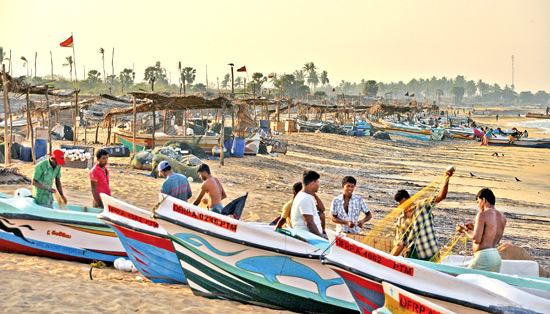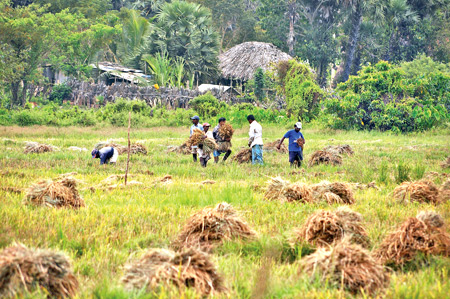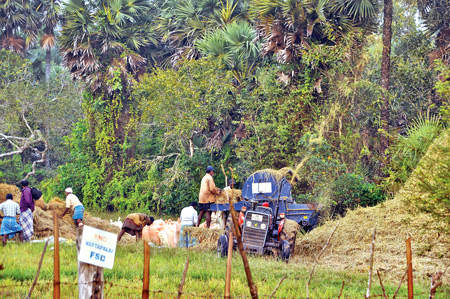|
A mine-infested region at one-time:
Agriculture and fisheries flourish in Mullaitivu
By Dhaneshi Yatawara
Since May 19, 2009, the Mullaitivu district has changed drastically.
Wider roads, better schools, new hospitals have entirely changed the
view of townships that were once ghostly.
 |
| The busy Nayaru beach |
 |
| |
 |
 |
| Paddy fields in
Vattappalai |
|

Mullaitivu District Secretary N. Vedanayagam |
There are no more hidden towns. Areas such as Puthumathalan,
Vadduvakal and Vellamullivaikkal from where thousands of civilians fled
from being a human shield for terrorists and moved towards safety now
have carpeted roads and public transport. In Pudukuduyirippu which
sheltered the LTTE leadership during their most active years has now
been converted into peaceful villages.
Five years after the end of the three-decade long battle against
terrorism, Mullaitivu district, the inner-most area of the Northern
Province, has arisen from the ashes.
Being isolated from the national development drive in the past, which
the rest of the country was privileged to enjoy, the Mullaitivu district
demands special attention. Under LTTE terrorism, the district remained a
largely mine-infested region, inaccessible to the Government's
development programs and experiencing constant exodus and displacement
of people.
Fisheries
Though not much known, Mullaitivu had been flourishing in the fishing
and agri-based industries during the good old days. There are
experienced farmers in dairying and crop agriculture but have not had
the opportunity to engage in economic development activities due to lack
of opportunities.
In the meantime, the people have started cultivating fruits such as
banana and papaya.
More than 70 percent of the people in the district are engaged in
agriculture, said the District Secretary N. Vedanayagam. According to
him almost all in the agriculture sector are now fully engaged in their
cultivation businesses.
Vedanayagam took his posting as the Mullaitivu Government Agent for
the first time in July 2010 and served for six months until December. He
he resumed duties in November 2011 and is in service to date.
"But the fisheries sector needs improvement," Vedanayagam said.
Mullaitivu district has a wonderful coastal stretch which is almost
70 kilometres long from Chundikulam to Kokilai.
"There is much potential for fishing. The fishermen say that in early
'80s when fishing was thriving nearly 20 lorry loads of fish were sent
to other parts of the country," he said.
The high cost involved in the fishing industry is a major drawback in
its development.
"An entire package of fishing equipment including outboard engines
will cost around Rs. 600,000. So providing facilities to the fishing
community can be hard on the Government," he said.
He said the Fisheries Ministry provides soft loan schemes and special
packages for the sector amidst these difficulties. In Mullaitivu a
fishermen's federation has now been set under which nearly 27 fishing
societies operate.
Another important issue in the area is migrating fishermen from the
other side of the country - Puttalam and Chilaw. A large number of
fisher families have tried to settle down in the Vellamullivaikkal area
since there are abundant resources for fishing.
Talking about the development taking place in the district, the GA
said that it was highly satisfactory for a short period of five years.
"In 2009 it took me about three hours to travel to Vavuniya by road
during the rainy season as the roads were in a dilapidated state. But
now of course an hour is more than enough to travel to Vavuniya on the
carpeted road," he said.
Development
Being equally important as an agriculture area, many parts of the
district depend on rain water for cultivation. Irrigation schemes are
there, but some need further improvement to provide water for more paddy
fields. The main irrigation tanks are in Muthiyankattu, Vavunikulam,
Thannimurippu and Vishvamadu. In addition there are minor tanks
scattered across. Nearly 20,000 families are engaged in farming,
according to the District Secretary.
How is the health sector? we asked. Being an essential factor in a
society properly set up health sector is a great immunity to the healthy
development of the district. "Compared to the days I first came here in
2009 there is a great improvement in the health sector. More doctors and
medical staff and more facilities," he said. One unfortunate situation
is those who receive education from this area and managed to become
doctors are not willing to serve their native place. "This is prevailing
in many sectors in the government service here and we find it difficult
to find suitable professionals to fill the vacancies," he explained.
"But I greatly appreciate that some Sinhala doctors are working here and
serving the poor people with the best of their abilities," he said with
a great smile.
In addition to these efforts, the Economic Development Ministry, with
the aim of strengthening community leaders for national development,
preparing resource builders and forging strong bonds between the North
and South are conducting workshops for newly resettled villages under
the direction of Minister Basil Rajapaksa.
At present, over 1,825 persons, from the North and from the South
have been trained. Covering nearly 21 districts, over 52 training
workshops for community resources building have been held under this
special program to strengthen mutual understanding and build friendship
between the North and the South.
Community
Villagers in the North and the South will appoint community leaders,
who in turn will arrange meetings between the two communities.
Accordingly, people from the South will be guests in homes in the North
where the guests will spend time with host families, have meals
together, exchanging a lifetime experience. In these newly resettled
areas more and more community leaders are coming up setting the
groundwork for aspiring political leaders to come up.
Houses to live, schools for the younger generation and better health
facilities with fully-fledged hospitals and medical centres have invited
the life back to these once restricted lands.
It is high time for the country to combine the enthusiasm of the
Mullaitivu people and its resources to the national development drive.
Within the past five years, since more attention has been given to the
physical development of the area, it is time to empower the people and
make them proud participants in the drive to develop Sri Lanka. |

